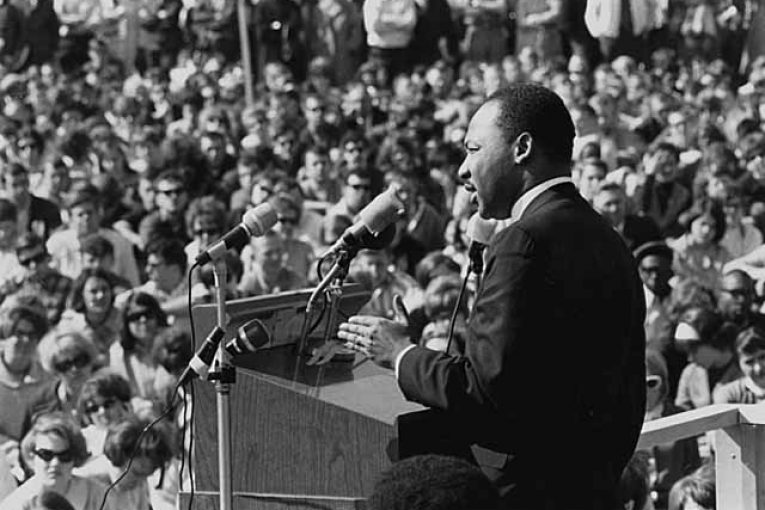

Via Wikimedia Commons

This work is licensed under a Creative Commons Attribution-ShareAlike 2.0 Generic License.
By Perla Brito
NEW YORK, NY – Federal Bureau of Information director J. Edgar Hoover had “animus” toward Martin Luther King, Jr., for a long time, according to authors Jonathon Eig and Jeanne Theoharis in New York Times Opinion piece this month.
Hoover’s goal was to divide MLK’s and President Lyndon Johnson’s collaboration, said Eig, author of the forthcoming book King: A Life, and Theoharis, author of The Rebellious Life of Mrs. Rosa Parks.
According to the authors, Hoover has been painted as “a kind of uncontrollable vigilante” and an “obsessive lawman,” while President Lyndon Johnson has been portrayed as a “genuine civil rights partner.”
Yet, the reality, “as new documents reveal…Johnson was more of an antagonist to King and a conspirator with Hoover,” said the authors.
In fact, they said, in the NY Times, it is important to “recognize the power structure that supported the FBI’s campaign,” including the president and many Americans, who believed MLK’s activist movement “posed threats to the established order” and that he “needed to be watched and controlled.”
According to Eig and Theoharis, the FBI’s attack could have been stopped or exposed, but instead government officials enabled it and members of the press stayed quiet; FBI records released in 2022 suggest that Johnson was informed weekly by Hoover on the FBI’s surveillance of MLK and did nothing to stop it.
“In all likelihood, that was because Johnson saw strategic advantage in knowing about King’s activities… and perhaps he saw even more utility when King began to criticize the president’s policies, especially concerning the Vietnam War,” said Eig and Theoharis.
They added, “At the same time, according to the president’s aides, Johnson clearly enjoyed having access to the prurient details of King’s life.”
The authors believe Johnson and Hoover were offended by MLK’s criticism of the federal government and “Johnson had a close relationship with Hoover before he became president” and “understood the value of gathering inside information on rivals.”
Files of Mildred Stegall, Johnson’s personal aide and administrative assistant, revealed a “much more nuanced — and damaging — picture of the partnership between Johnson and Hoover,” the authors said, writing, “The sheer volume of these memos to the president — more than 250 over five years — further demonstrates Johnson’s intimate familiarity with the FBI’s campaign.”
The NY Times opinion piece noted Cartha DeLoach, Hoover’s liaison to the White House and FBI assistant director, “wrote to Hoover to say [former White House aide Walter Jenkins] Mr. Jenkins had read the most recent report on King” and “considered it one of the most repulsive incidents that he knew of” in a memo dated Jan. 14, 1964.
The authors write Johnson was informed on all of MLK’s “conversations with his top advisors” by the FBI, and journalists from The LA Times, The NY Times, The Chicago Daily News, and other news outlets received “salacious files about King’s extramarital affairs” and were given questions by the FBI to ask MLK.
The authors said none of the media “chose to report that the FBI was conducting a massive surveillance campaign against law-abiding American citizens.”
According to Eig and Theoharis, “many of the memos Hoover sent to Johnson might be described as opposition research. They show that even as Johnson and King worked together, King was still treated as an adversary to be managed and controlled.”
The surveillance continued until King’s death on April 4, 1968, Eig and Theoharis said, adding, “Hoover’s campaign revolved around power — making sure King didn’t have too much of it.”
“After witnessing King’s success at the March on Washington in 1963, William Sullivan, the FBI assistant director responsible for the domestic intelligence division under Hoover, made the decision to bug King’s room at the Willard Hotel in Washington, D.C., noting, ‘We must mark him now…(King is) “the most dangerous Negro of the future in this nation.,”‘” charged the authors.
Eig and Theoharis said, “FBI officials supplied journalists with files containing evidence gathered from listening devices planted in King’s hotel rooms (but) Hoover did not act alone. In fixating on Hoover, we ignore the phalanx of informed government officials, from the president on down, and let the broader American public and media off the hook.”
The authors write that “just before the March on Washington, a Gallup poll found that only 23 percent of Americans had favorable opinions of the proposed rally. Seeing the civil rights movement as dangerous was not a fringe position (yet). These revelations do not diminish Hoover’s core responsibility in one of the most troubling episodes in American law enforcement history.”
The NY Times piece authors added the revelations showed “widespread support for and complicity in the campaign against King, and as such they should force a re-examination of the conditions that led so many Americans to turn their backs on one of our great moral leaders. To take that seriously requires a broader reckoning about how the government, the media and the public react to those who challenge the status quo.”
Eig and Theoharis said that, in a phone call MLK had with Mr. Levison, MLK said, “Let’s face it. We do have a great public-relations setback where my image and leadership are concerned,” adding, “It will put many Negroes in the position of saying, ‘Well, Martin Luther King is at the end of his rope.’”
According to the authors, this call was recorded by the FBI.